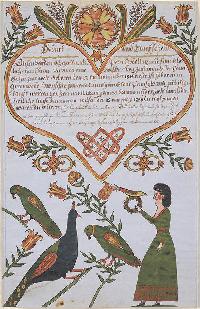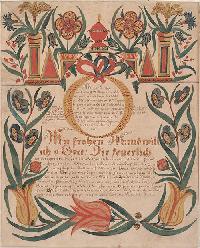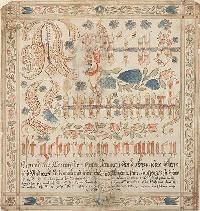Did you know that German immigrants started towns in Pennsylvania as early as 1683? If you have German ancestry, you might be able to connect with your Pennsylvania German heritage using the Free Library’s Fraktur Digital Collection!
Pennsylvania Germans made personal documents – called fraktur – to record important life events such as births and baptisms. Our digital collection contains more than 1200 fraktur made in Pennsylvania, Ohio, Virginia, and surrounding states between 1750 and 1845.
You can search our collection by entering the last name of your Pennsylvania German relative or by browsing by the first letter of the last name. Don’t worry if you don’t know exactly how to spell the name – the search engine is indexed phonetically (by sound) rather than alphabetically.
Standardized spelling of proper names is a relatively recent trend, even in the United States. Through the 1800s, people often wrote their names according to how they sounded, so it’s not uncommon to find a person’s name spelled in different ways – even on the same document! Recent immigrants sometimes changed the spelling of their last names to better fit in with their neighbors. Other families modified the pronunciation of their last name but kept the original spelling. All of these factors created wide variations in the spellings of last names, which can make it difficult to find records of your relatives.
In the 1930s, the United States Census Bureau recognized this problem and developed a coding system called Soundex to help people track down their ancestors. Using the US Census Bureau’s program as a model, we have indexed all of our fraktur in Soundex, so that you can find a name, no matter how many alternate spellings or variations it might have.
All you have to do is type in a last name to find the names from all of our fraktur records that sound similar to the one you entered. Say, for example, that your last name is “Bair.” When you type “Bair” into the search box, you will find fraktur that include every name that sounds like “Bair” including Baehr, Baer, Bähr, Bär, Bauer, Beier, Beyer, Biewer and Boyer. To learn more about Soundex, visit the United States National Archives website.
For more Free Library resources to help you search for your family tree, check out our Genealogy Explore Topic. To explore our Fraktur Digital Collection and search for your family records, click on “Collections” from the About the Library page. Good luck with your search!
Have a question for Free Library staff? Please submit it to our Ask a Librarian page and receive a response within two business days.
Great post! Thanks.
Friday, July 24, 2009
this was a nice blog that someone has written(haven even read it)
Tuesday, July 28, 2009
Great post. I'm looking forward to learning more.
Sunday, August 16, 2009
I have always been very interested in exploring the German heritage as it is so much diversified than other cultures! - !
Sunday, August 23, 2009
These images are beautiful and the discussion attached to them is well-written and thought-provoking. One point that's made, which is very important to remember in doing genealogical research, is the explanation of name-spelling changes. To my knowledge I have no German ancestry, but the advice is universally applicable: family names change in spelling and sometimes pronunciation, and the results can be very frustrating until you happen upon a clue that answers a question! Example: I spent years hunting for some immigration records, knowing my great-grandmother's name and country of origin, but kept striking out--until the day I saw a handwritten ship passenger list on a database, with my grandfather's (her son's) last name, beginning with Z, written European style, with a crossbar through the Z that made it look for all the world like an F. To someone trying to read a European ship pursar's early-20th-century handwriting, and then type that entry into a database, it must have been confusing. On a hunch I went back to the Ellis Island entry for that ship and year, and looked for surnames beginning with F. Mystery solved!
Genealogy is a combination of history, biography and mystery, three of my favorite subjects. Anyone who thinks history is boring and irrelevant should study it first as personal history, family or ethnic-group history, and the history of his or her own (or ancestral) neighborhood or region. Like any other subject, once history is personal, it's no longer dull.
Thursday, November 19, 2009
One of my distant grandfathers was one of the original 13 founders of Germantown. He was Hermann Updegrave. This was a really exciting discovery to make when tracing my ancestry. It's also what led me to expand my studies to . Thanks for this little article.
Wednesday, November 25, 2009
Wow ! It was a great post. I liked this post very much.Having a passion about I understood every point after going through your blog carefully.
Friday, August 27, 2010
Cool post! The certificate images really add a rustic feel to it!
Monday, November 22, 2010
learn
Monday, December 13, 2010
After years of guessing the origin of my last name, I finally know!
Monday, July 18, 2016
would liken to know more about myfamily
Tuesday, March 24, 2020



